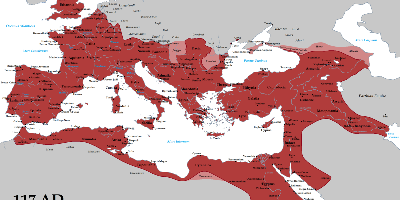Hellenistic Period (1 janv. 323 av. J.-C. – 1 janv. 31 av. J.-C.)
Description:
The Hellenistic period covers the period of Mediterranean history between the death of Alexander the Great in 323 BC and the emergence of the Roman Empire as signified by the Battle of Actium in 31 BC and the conquest of Ptolemaic Egypt the following year. The Ancient Greek word Hellas is the original word for Greece, from which the word Hellenistic was derived.During the Hellenistic period Greek cultural influence and power reached the peak of its geographical expansion, being dominant in the Mediterranean World and most of West and Central Asia, even in parts of the Indian subcontinent, experiencing prosperity and progress in the arts, exploration, literature, theatre, architecture, music, mathematics, philosophy, and science. It is often considered a period of transition, sometimes even of decadence or degeneration, compared to the enlightenment of the Greek Classical era. The Hellenistic period saw the rise of New Comedy, Alexandrian poetry, the Septuagint and the philosophies of Stoicism, Epicureanism, and Pyrrhonism. Greek science was advanced by the works of the mathematician Euclid and the polymath Archimedes. The religious sphere expanded to include new gods such as the Greco-Egyptian Serapis, eastern deities such as Attis and Cybele and a syncretism between Hellenistic culture and Buddhism in Bactria and Northwest India.
After Alexander the Great's invasion of the Achaemenid Empire in 330 BC and its disintegration shortly after, the Hellenistic kingdoms were established throughout south-west Asia (Seleucid Empire, Kingdom of Pergamon), north-east Africa (Ptolemaic Kingdom) and South Asia (Greco-Bactrian Kingdom, Indo-Greek Kingdom). The Hellenistic period was characterized by a new wave of Greek colonization which established Greek cities and kingdoms in Asia and Africa. This resulted in the export of Greek culture and language to these new realms, spanning as far as modern-day India. Equally, however, these new kingdoms were influenced by the indigenous cultures, adopting local practices where beneficial, necessary, or convenient. Hellenistic culture thus represents a fusion of the Ancient Greek world with that of the Near East, Middle East, Northeast Africa and Southwest Asia. This mixture gave rise to a common Attic-based Greek dialect, known as Koine Greek, which became the lingua franca through the Hellenistic world.
Scholars and historians are divided as to what event signals the end of the Hellenistic era. The Hellenistic period may be seen to end either with the final conquest of the Greek heartlands by Rome in 146 BC following the Achaean War, with the final defeat of the Ptolemaic Kingdom at the Battle of Actium in 31 BC, or even the move by Roman emperor Constantine the Great of the capital of the Roman Empire to Constantinople in AD 330. "Hellenistic" is distinguished from "Hellenic" in that the first encompasses the entire sphere of direct ancient Greek influence, while the latter refers to Greece itself.
Ajouté au bande de temps:
Date:
1 janv. 323 av. J.-C.
1 janv. 31 av. J.-C.
~ 292 years
